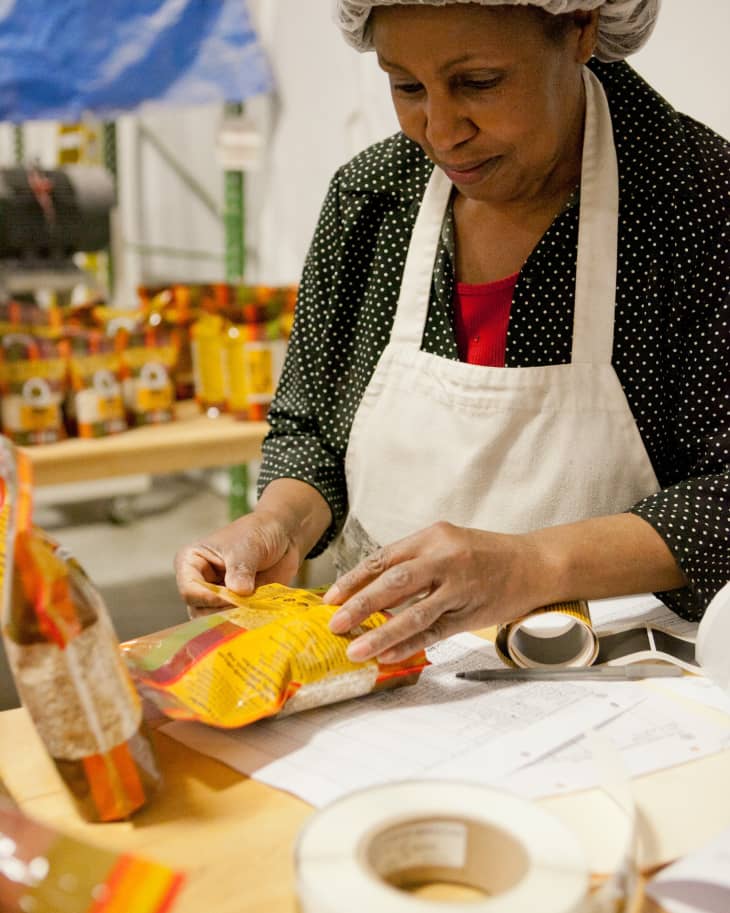How Sprouted Flour Is Made: A Tour of To Your Health’s Sprouted Flour Factory in Alabama
The Tour: To Your Health Sprouted Flour Co.
What: Organic, whole-grain sprouted flour
Where: Fitzpatrick, Alabama
Read the series → Part One, Part Two
Earlier this week we introduced you to Peggy Sutton, founder and owner of the To Your Health Sprouted Flour Co. in Fitzpatrick, Alabama. Ten years ago Peggy started sprouting and grinding whole grains in her kitchen. Today she runs three large production facilities that produce over 3 million pounds of sprouted grains every year, with every batch of flour still ground fresh to order.
We visited one of the To Your Health facilities a few weeks ago for a step-by-step look at the production process. It all starts with the grain — specifically, 25 different kinds of non-GMO, kosher, organic grains.
The Right Stuff
To Your Health makes flour from 25 different grains and legumes, including red and white wheat, spelt, KAMUT, rye, black beans, corn, brown rice, barley, amaranth, and sorghum. The company also leaves some of its sprouted grains unground and sells them that way.
Most of the grains come from the Pacific Northwest or the Midwest in the United States, although Peggy is working to establish sources closer to home.
Old Idea, Modern Methods
The sensory experience of a walk through the To Your Health facilities hits your nose first. The soft, comforting smell of fresh bread fills the air, but is actually the scent put off by the grains themselves. Here’s how it works:
The Process
Step One — Raw Grains: They arrive at the factory in large bags and wait their turn to enter the first step in the process, the soaking cycle, where water is added and their moisture content increases from 12 percent to 37 percent.
Step Two — The Germination Cycle: The water is drained and the wet, plumped-up grains are left to begin growing. After about 24 hours, the grains start to “sprout,” and little tails protrude from one end.
Step Three — Drying: The sprouted grains are then dried using a proprietary process for 24 hours. They rest on trays stacked on racks in a climate-controlled environment, which halts the sprouting process. “We keep the temperature low during this part to ensure the healthy enzymes are maintained. This is important to some of our customers who want to eat the grains raw,” Peggy says.
Step Four — Grinding: The grains being made into flour are poured into the hungry mouths of hoppers on mills that use stones to grind them into a fine, fluffy powder. “The stones add one more level of control; they allow us to keep the temperature steady,” Peggy says. The mills hum gently as they do their job; a “whoosh” announces the ground grain is being sucked up a pipe to run through a sifter before the finished flour pours down into a barrel.
Step Five — Texture Test: Workers then test the texture by hand, grabbing a palmful and squeezing to see if it keeps its shape. If it does, it’s ready. If it doesn’t bond properly, it’s sent through the mill again. When it’s right, it’s measured, packaged, and shipped either to wholesale customers or retail markets.
Branching Out
The company started in 2006 and has grown almost exponentially since, thanks to a commitment to quality in its ingredients and its methods. In 2014, To Your Health turned out 1-million pounds of flour and expects to triple that number this year.
Despite this outsized demand, To Your Health still grinds its flours fresh to order, just like it did in the beginning, and the entire process takes about four days. The company’s 31 employees work hard to produce sprouted grains and sprouted-grain flours for customers around the country and around the world, including national companies like Kellogg, which plans to use To Your Health sprouted grains in a new Kashi brand cereal.
Several other large brands source their flours from To Your Health as well. “It’s been amazing to watch the concept take off,” Peggy says. “But it really just speaks to people’s desire to get back to the basics and their search for better taste.”
